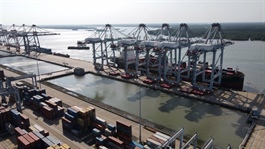Revised Enterprise Law to tighten capital control, boost inspections
Revised Enterprise Law to tighten capital control, boost inspections
The draft law is expected to be discussed and approved during the ongoing session of the 15th National Assembly.

Chairman of the Bắc Ninh People’s Committee, Vương Quốc Tuấn (second from left) visits a company at Tiên Sơn Industrial Park. VNA/VNS Photo Thái Hùng |
The Vietnamese Government has submitted a draft amendment to the Enterprise Law to the National Assembly, focusing on curbing the use of 'virtual capital' and enhancing transparency in corporate operations.
The draft law is expected to be discussed and approved during the ongoing session of the 15th National Assembly.
The proposed amendments aim to clarify key concepts and reinforce prohibited acts. Notably, definitions related to dividends and the market value of shares and capital contributions (Clauses 5 and 14, Article 4) have been revised to align with accounting standards and real-life stock market practices. The calculation of a listed share’s average value over 30 days will serve as the standard to help prevent price manipulation.
A significant addition is the explicit inclusion of 'false declarations' as a prohibited act (Clause 4, Article 16). Although this offence is already covered under the Penal Code, it remains common in practice, particularly in cases involving forged signatures in business registration documents.
The draft law also expands the scope of individuals permitted to establish enterprises, allowing public university lecturers and staff to contribute capital and participate in the management of businesses aimed at commercialising scientific research, provided they receive prior approval from authorised bodies. This aligns with National Assembly Resolution No. 193/2025/QH15 on mechanisms to promote science, technology and innovation.
Amendments have also been proposed to regulations on capital transfer in limited liability companies with two or more members (Point a, Clause 1, Article 52), capital reduction following capital repayment (Point a, Clause 5, Article 112), shareholders’ responsibilities in convening general meetings (Clause 4, Article 115) and the criteria for drawing up shareholder lists (Clause 1, Article 141).
In addition, the requirement to notify changes in information has been removed for companies already listed or registered for trading (Clause 3, Article 176).
Shifting from pre-checks to post-checks
A standout feature of the revised law is the increased responsibility assigned to provincial-level People’s Committees (Clause 3, Article 215) in supervising enterprises post-registration. This includes developing inspection procedures and issuing inter-agency coordination regulations at the local level.
According to the Government’s report, these changes are designed to prevent exaggerated or fictitious capital declarations—commonly observed before firms become public companies, issue private bonds, or engage in tax fraud and state budget misappropriation.
While some experts have called for mandatory financial capacity verification or asset valuation reports at the registration stage to increase transparency, both the Ministry of Finance and the Ministry of Justice have objected, citing concerns over increased administrative burden and compliance costs. Instead, the Government supports enhanced post-registration inspections, in line with global regulatory trends and the Party and State’s institutional reform agenda.
The proposed law also significantly decentralises enterprise management to provincial authorities. Local governments would be responsible for handling business registration, conducting inspections, addressing capital-related violations, and coordinating with other regulatory agencies in overseeing corporate activities. This approach is expected to improve enforcement, enhance the effectiveness of post-registration monitoring, and reduce legal breaches in the business sector.
- 09:27 08/05/2025



























